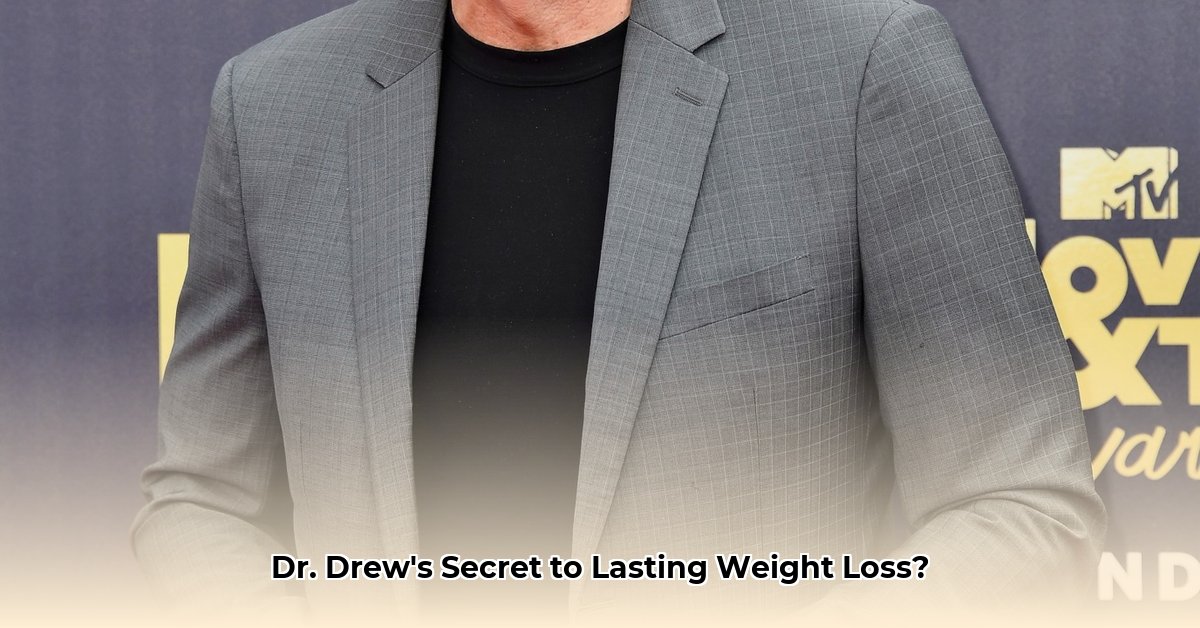
Losing weight and keeping it off can feel like an uphill battle, fraught with tempting shortcuts and fleeting promises. The allure of quick fixes—fad diets promising rapid results—is strong, yet they often lead to disappointment and potential health risks. Dr. Drew Pinsky's approach offers a refreshing alternative: a sustainable, holistic strategy focused on fostering lasting lifestyle changes rather than temporary deprivation. This isn't about restrictive diets; it's about building a healthier, happier you.
Understanding Dr. Drew's Weight Loss Philosophy: A Holistic Approach
Dr. Drew's method isn't a quick fix; it's a long-term commitment to well-being. He emphasizes that successful weight management isn't solely about the number on the scale; it's about nurturing both your physical and mental health. This holistic approach recognizes the interconnectedness of your body and mind, promoting a sustainable lifestyle change rather than a restrictive diet. Are you ready to prioritize lasting well-being over fleeting weight loss?
The Cornerstones of Success: Nourishment and Movement
Dr. Drew's approach centers around two fundamental pillars: mindful nutrition and regular physical activity. Mindful eating encourages awareness of your hunger cues. Before reaching for a snack, ask yourself: Am I truly hungry, or am I driven by stress, boredom, or tiredness? Consciously choosing nutritious foods—whole grains, fruits, vegetables, lean proteins—supports your body's needs.
Exercise, too, plays a pivotal role. The focus isn't high-intensity workouts; it's about consistent movement. A daily walk, a bike ride, or even dancing can contribute to your overall health. How much daily movement is ideal for your body? The key is finding enjoyable activities that you can sustain long-term.
Beyond the Scale: The Crucial Role of Mental Well-being
Weight loss is as much a mental journey as a physical one. Stress, anxiety, and emotional eating can significantly impact your efforts. Dr. Drew highlights the importance of stress management techniques like mindfulness and meditation. Carving out time for relaxation and self-care are vital components of a holistic approach to well-being. How do you usually handle stress? Are there healthier strategies you could incorporate?
A Balanced Perspective: Realistic Expectations and Embracing the Journey
Sustainable weight loss isn't a sprint; it's a marathon. Setting achievable goals, celebrating small milestones, and learning from setbacks are all critical. Dr. Drew encourages patience and perseverance, recognizing that the journey involves ups and downs. Rather than focusing solely on the number on the scale, celebrate improvements in your energy levels, sleep quality, and overall mood.
Comparing Approaches: Fad Diets vs. Sustainable Strategies
The following table illustrates the stark contrast between fad diets and Dr. Drew's sustainable approach:
| Approach | Short-Term Results | Long-Term Results | Health Risks | Sustainability |
|---|---|---|---|---|
| Fad Diets (e.g., Very Low Calorie Diets) | Potentially Rapid | Usually Very Low | Often High | Typically Very Low |
| Dr. Drew's Approach | Gradual | High Potential | Generally Low | High |
This comparison showcases the potential dangers of quick fixes versus the long-term benefits of sustainable lifestyle changes. Fad diets, often characterized by extreme calorie restriction or elimination of entire food groups, may yield initial weight loss, but they are rarely maintained long-term and can pose serious health risks.
Practical Steps for Success: Building Your Personal Plan
Ready to embark on your weight loss journey? Follow these steps:
Consult Your Doctor: Discuss your weight loss goals with your physician to ensure your plan aligns with your health status.
Create a Balanced Eating Plan: Focus on whole, unprocessed foods: fruits, vegetables, lean proteins, and whole grains.
Incorporate Regular Physical Activity: Aim for at least 30 minutes of moderate-intensity exercise most days of the week – find activities you enjoy!
Develop Healthy Coping Mechanisms: Identify and address emotional eating triggers by incorporating relaxation techniques like mindfulness or meditation.
Track Your Progress: Monitor your weight, but also focus on improvements in energy levels, sleep, and overall well-being.
Seek Support: Join a support group or lean on friends and family for encouragement and accountability—a supportive network can make a huge difference.
How to Avoid Dangerous Fad Diets for Sustainable Weight Loss
The internet is rife with conflicting nutritional information. How can you discern reliable advice from misleading claims? Prioritize information from reputable sources like peer-reviewed studies and registered dietitians. Remember, sustainable weight loss is a gradual process; be patient, celebrate your progress, and don't let setbacks derail your journey. By focusing on lasting lifestyle changes rather than temporary fixes, you'll be well on your way to achieving lasting, healthy weight loss.